 |
September 12th, 2012 by Cheryl Rowan | Posted in Emergency Preparedness, General (all entries), Outreach, Public Health | No Comments »

Several government agencies (FEMA, Citizen Corps, CDC, and others) as well as the American Public Health Association (APHA) have once again joined to promote the month of September as National Preparedness month. As Americans remember the events of 9/11, they also encourage all Americans to prepare themselves, their families and their communities for all disasters and hazards, including infectious disease, natural disasters and other emergencies. Throughout the month, more than 3,000 organizations nationwide are supporting efforts to help Americans prepare in case of emergency, with many events culminating on “Get Ready Day, ” September 18th (see http://www.getreadyforflu.org/ ).
For more information and resources for planning an event: http://www.publichealthnewswire.org/?p=5040 .
Additional resources for Disaster Information and Emergency Preparedness from:
September 4th, 2012 by Karen Vargas | Posted in Consumer Health, General (all entries), NLM Announcements, Technology | Comments Off

The National Library of Medicine is pleased to announce the release of a new educational resource, GeneEd http://geneed.nlm.nih.gov/. Developed in collaboration with the National Human Genome Institute (NHGRI), teachers and experts in genetics and genetic counseling, GeneEd is a useful resource for students and teachers in grades 9 – 12 to learn genetics. GeneEd allows students and teachers to explore topics such as Cell Biology, DNA, Genes, Chromosomes, Heredity/Inheritance Patterns, Epigenetics/Inheritance and the Environment, Genetic Conditions, Evolution, Biostatistics, Biotechnology, DNA Forensics, and Top Issues in Genetics.
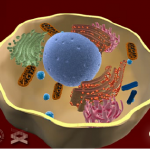
GeneEd is a portal that teachers can use to introduce topics, supplement existing materials, and provide as a reliable source to students conducting research. The site links to categories such as research articles, animation, games, videos, interactive tutorials, and labs and experiments. 3D images, illustrations and text from NHRGI help to enrich the user experience by providing vivid imagery to reinforce genetic concepts.
Specialty pages including Teacher Resources and Labs and Experiments highlight those tools that teachers may find particularly helpful. Other specialty pages such as Careers in Genetics and Highlights allow students to see what is new and noteworthy in the field of Genetics along with links to different careers related to the science of Genetics.
August 28th, 2012 by Emily Hurst | Posted in Emergency Preparedness, General (all entries), Technology | Comments Off
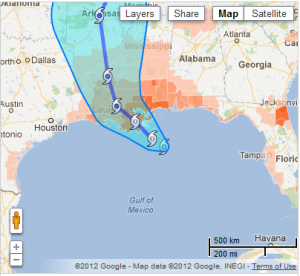
With Hurricane Isaac expected to make landfall in the Louisiana area Wednesday morning, the Gulf Coast community is already preparing for the anticipated wind, rain, and possible rising waters. Google Crisis Response is a new website from Google that provides access to important information in the event of emergencies. A global tool, Google Crisis Responses brings together information from participating organizations and existing data to provide up to the minute information and updates for those in need and those responding to crisis events. The Crisis Map combines data and provides a map view of areas that are in danger. All in all, Google Crisis Response is a site supported by ““staff engineers, product managers, and partnership professionals who are dedicated to working on efforts that focus on making critical information more accessible during natural disasters”. Look to Google Crisis Response as an online tool in the event of future emergencies.
According to the Google Blog from the Hurricane Isaac Crisis Map you will be able to find emergency preparedness information, including:
- Isaac’s current location and projected path, courtesy of the NOAA-National Hurricane Center;
- Weather updates and data, including radar and cloud imagery from weather.com and the U.S. Naval Research Laboratory;
- Evacuation information and routes;
- Shelter and recovery centers locations;
- Storm-related YouTube videos, including many curated by Storyful.
August 28th, 2012 by Michelle Malizia | Posted in General (all entries) | Comments Off
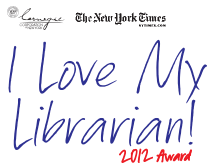
Do you know of a great librarian who deserves to be recognized? Why not nominate him/her for the 2012 Carnegie Corporation of New York/New York Times I Love My Librarian Award? The Carnegie Corporation of New York/New York Times I Love My Librarian Award encourages library users to recognize the accomplishments of exceptional public, college, community college, or university librarians.
Ten librarians each will receive a $5,000 cash award, a plaque and $500 travel stipend to attend an awards reception in New York. In addition, a plaque will be given to each award winner’s library.
Recognize the accomplishments of your exceptional public, school, college, community college, or university librarian.
Nominate your college, community college or university librarian
Nominate your public librarian
Nominations must be received by September 12.
August 27th, 2012 by Michelle Malizia | Posted in General (all entries), Grants and Funding | Comments Off

Congratulations to Katherine “Katie” Prentice for being the recipient of the 2012 Emerging Leaders Award. The NN/LM SCR partnered with the South Central Academic Medical Libraries Consortium (SCAMeL) to offer this award in order to motivate and prepare a librarian for a position of leadership in an academic health sciences library. Modeled on the NLM/AAHSL Leadership Fellows Award, this project will pair Katie with her mentor, Debbie Sibley of the Louisiana State University Health Sciences Center – New Orleans Library (LSU-NOLA). Katie will have the opportunity to develop her knowledge and skills in a variety of learning settings, including exposure to leadership in another environment.
As part of the award, Katie will travel to the LSU-NOLA library to meet with Debbie. She will also visit the NN/LM SCR office to learn how it interfaces with the Region as a whole.
August 24th, 2012 by Cheryl Rowan | Posted in Consumer Health, General (all entries), Public Health | Comments Off
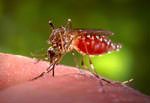
This year’s West Nile virus outbreak is on track to be the biggest ever since the virus first appeared in the United States in 1999, U.S. health officials reported Wednesday.
As of the third week of August, there have been a total of 1,118 cases of West Nile virus in people in 38 states, including 41 deaths.
In Texas, which has been hardest hit by the epidemic, 586 cases have been reported with 21 deaths, said Dr. David Lakey, commissioner of the Texas Department of State Health Services. Officials in Dallas County, Texas, began aerial spraying of insecticides overnight last Thursday. Louisiana, Mississippi and Oklahoma have also been hit hard by West Nile virus this summer.
Experts do not know why this year’s outbreak is so much worse than previous years, but suspect it could be a confluence of factors, most notably hot weather. Generally speaking, 80 percent of people who are infected with West Nile virus develop no or few symptoms, while 20 percent develop mild symptoms such as headache, joint pain, fever, skin rash and swollen lymph glands. Less than 1 percent will develop neurological illnesses, such as encephalitis or meningitis, and develop paralysis or cognitive difficulties that can last for years, if not for life.
There are no specific treatments for West Nile virus; the greatest risk for infection with West Nile virus typically occurs from June through September, with cases peaking in mid-August.
The best way to protect yourself from West Nile virus is to avoid getting bitten by mosquitoes, which can pick up the disease from infected birds. The CDC recommends the following steps to protect yourself:
- Use insect repellents when outside.
- Wear long sleeves and pants from dawn to dusk.
- Don’t leave standing water outside in open containers, such as flowerpots, buckets and kiddie pools.
- Install or repair windows and door screens.
- Use air conditioning when possible.
More information at: http://www.nlm.nih.gov/medlineplus/news/fullstory_128510.html
See also MedlinePlus Health Topic page on West Nile Virus: http://www.nlm.nih.gov/medlineplus/westnilevirus.html and CDC on West Nile Virus and Protecting Mosquito Bites: http://www.cdc.gov/features/StopMosquitoes/ .
[HealthDay News, August 22, 2012]
August 20th, 2012 by Michelle Malizia | Posted in General (all entries), NLM Announcements | Comments Off
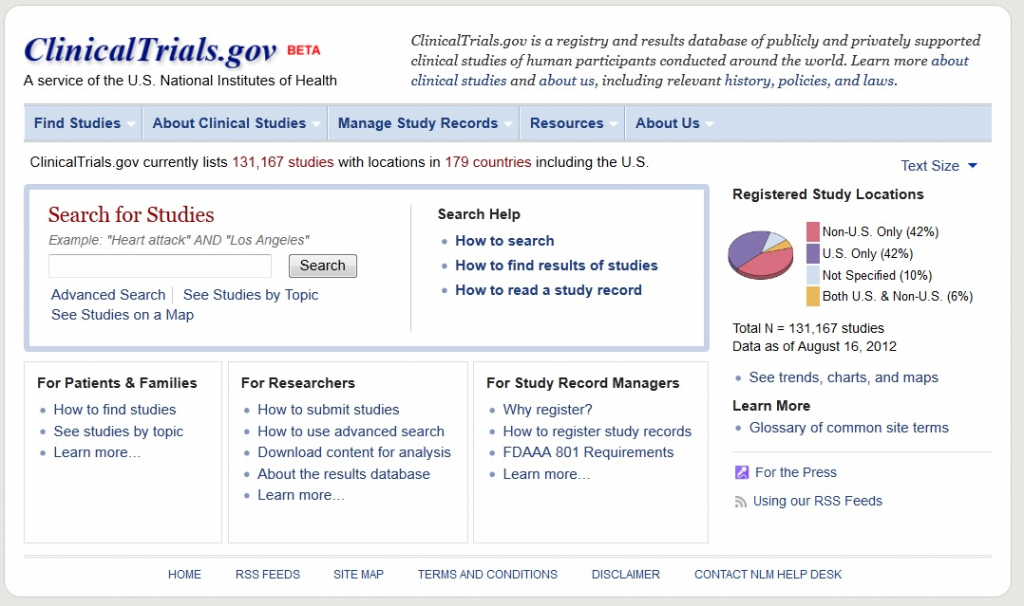
On August 13, 2012, visitors to the ClinicalTrials.gov Web site and the accompanying Protocol Registration System (PRS) Information Web site (designed for data providers) saw a link to a beta site including a new integrated homepage and updated graphic design for the site (http://clinicaltrials.gov/beta/). Visitors will also have access to new and reorganized written content about clinical research, background information about the site, searching for studies, and maintaining study records. However, core functions of the site — including the basic and advanced search, search results options, and the study record data – will remain the same. The new site interface will run in parallel with the previous version for approximately four weeks after launch. After appropriate testing and additional minor changes it will permanently replace the previous interface.
August 6th, 2012 by Michelle Malizia | Posted in General (all entries), NLM Announcements, NLM Technical Bulletin | Comments Off

What’s in a name? PubMed Central, a free full-text archive of biomedical and life sciences journal literature at the U.S. National Library of Medicine, has shortened its name to PMC in order to avoid confusion with PubMed. What’s also new is PMC’s look and feel, which has been updated to conform to NCBI’s new standards for page design. This redesign allows for a cleaner and more uniform presentation across PMC’s site as well as its article, issue and journal archive pages.
More information on this and other PMC changes is available in the NLM Technical Bulletin.
July 30th, 2012 by Michelle Malizia | Posted in General (all entries), Grants and Funding | Comments Off

The NN/LM SCR recently provided funding to two Universities who will develop pilot projects to identify and promote the roles of libraries in institutions that have received NIH Clinical and Translational Science Awards (CTSA) with a focus on community engagement:
Institution: The TMC Library (Texas Medical Center Library), Houston TX
Description: The TMC Library will conduct two focus group sessions with each Community Advisory Board (CAB) to assess the level of knowledge of evidence-based principles, followed by conducting training for each CAB on searching evidence-based practice research databases. In addition, project staff will create a standardized curriculum for training in evidenced-based medicine. Each CAB will receive a two-hour training session using this curriculum.
Institution: University of Texas Health Science Center at San Antonio, San Antonio TX
Description: The proposed project has two components: 1) to host two Asset-Based Community Development workshops in San Antonio and Harlingen, respectively, in order to support community engagement efforts in these areas and in the other CTSA funded areas within the NN/LM SCR region; and 2) to host a strategic planning session for CTSA librarians in the NN/LM SCR region.
July 20th, 2012 by Michelle Malizia | Posted in General (all entries), Grants and Funding, NLM Announcements | Comments Off

The Leadership Fellows Program, sponsored by the National Library of Medicine (NLM) and the Association of Academic Health Sciences Libraries (AAHSL), is currently accepting applications and nominations for the August 1, 2012, deadline for potential fellows for the 2012-2013 experience. The Leadership Fellows Program is focused on preparing emerging leaders for the position of library director in academic health sciences libraries. Fellows will have the opportunity to develop their knowledge and skills in a variety of learning settings, including exposure to leadership in another environment. They will be paired with mentors who are academic health sciences library directors. In addition to the individual relationship with their mentors, fellows benefit from working collaboratively with other fellows and mentors. Experienced Program faculty and mentors will provide content and facilitation for the cohort.
Candidates for fellow should have a strong interest in pursuing a directorship in academic health sciences libraries, as well as significant management experience. Applications are welcomed from professionals working in academic health sciences libraries, hospital libraries, or other library-related settings. Applications from qualified minority candidates are encouraged.
Applications due: August 1, 2012
More information is available at NLM’s News and Events.
|
 |














